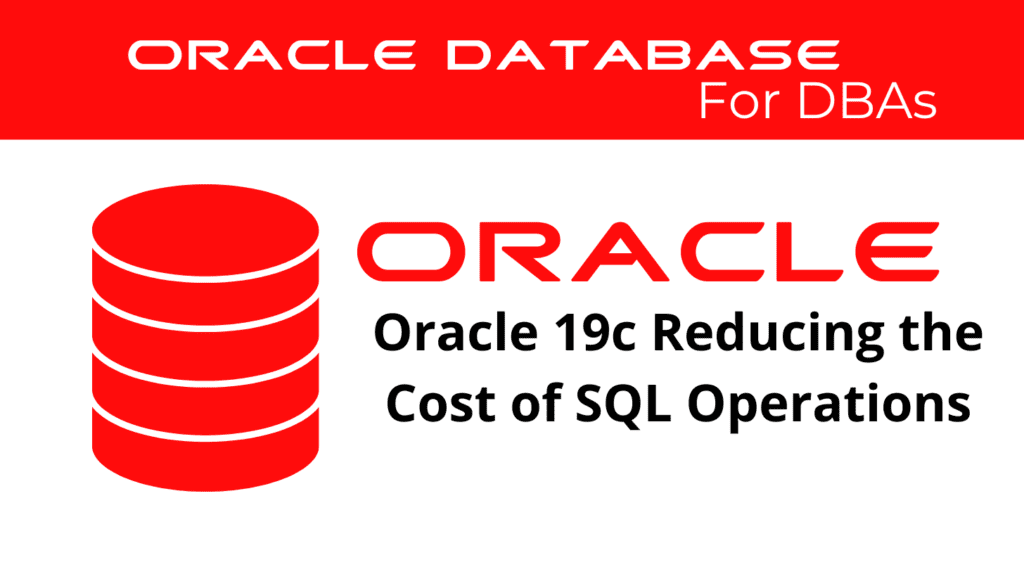
Reducing the cost of SQL operations is essential for achieving efficient database performance, especially when working with Oracle 19c. By understanding and implementing SQL operation cost reduction techniques, we can optimize SQL performance and ensure our database runs smoothly. In this article, we will explore various methods to achieve SQL cost reduction and improve overall database efficiency.
Understanding SQL Cost Reduction
The Importance of SQL Cost Reduction
SQL cost reduction is crucial for maintaining a high-performing database environment. By reducing the cost of SQL operations, we can enhance the responsiveness of our database applications, leading to better user experiences and more efficient resource utilization.
Key Parameters for Reducing SQL Cost
To effectively reduce SQL cost, we need to focus on specific optimizer parameters. These parameters influence how the Oracle optimizer evaluates and executes SQL statements. Here are some essential parameters to consider:
OPTIMIZER_MODE
The OPTIMIZER_MODE parameter determines the optimizer’s approach to SQL execution plans. By setting this parameter to ALL_ROWS, we can optimize the overall throughput, which is ideal for batch processing and reports. Conversely, setting it to FIRST_ROWS_n optimizes for faster response times for interactive applications.
ALTER SYSTEM SET OPTIMIZER_MODE='ALL_ROWS';
OPTIMIZER_INDEX_COST_ADJ
The OPTIMIZER_INDEX_COST_ADJ parameter adjusts the cost of index scans relative to full table scans. Lowering this parameter’s value makes index scans more favorable, which can reduce SQL cost in certain scenarios.
ALTER SYSTEM SET OPTIMIZER_INDEX_COST_ADJ=50;
DB_FILE_MULTIBLOCK_READ_COUNT
The DB_FILE_MULTIBLOCK_READ_COUNT parameter determines the number of blocks read in a single I/O operation during full table scans. Increasing this value can improve the performance of full table scans, thereby reducing SQL cost.
ALTER SYSTEM SET DB_FILE_MULTIBLOCK_READ_COUNT=32;
Techniques to Optimize SQL Performance
Using SQL Hints
SQL Cost Reduction – SQL hints are directives added to SQL statements to influence the optimizer’s behavior. They can be used to control various aspects such as join methods and access paths. Here are some examples:
INDEX Hint
The INDEX hint forces the optimizer to use a specific index for a query.
SELECT /*+ INDEX(employees emp_last_name_idx) */ last_name
FROM employees
WHERE last_name = 'Smith';
FULL Hint
The FULL hint forces a full table scan.
SELECT /*+ FULL(employees) */ *
FROM employees;
Gathering Optimizer Statistics
SQL Cost Reduction – Accurate optimizer statistics are essential for the optimizer to make informed decisions. Using the DBMS_STATS package, we can gather statistics to ensure the optimizer has the most up-to-date information.
EXEC DBMS_STATS.GATHER_SCHEMA_STATS('HR');
SQL Plan Management
SQL Plan Management (SPM) helps maintain consistent SQL performance by managing execution plans. By creating SQL plan baselines, we ensure that only verified and optimal plans are used for specific SQL statements.
DECLARE
sql_handle VARCHAR2(30);
BEGIN
sql_handle := DBMS_SPM.LOAD_PLANS_FROM_SQLSET(
sqlset_name => 'my_sqlset',
sqlset_owner => 'HR'
);
END;
/
Implementing SQL Cost Reduction Strategies
Adaptive Query Optimization
Oracle 19c introduces adaptive query optimization features that adjust execution plans based on runtime statistics. Enabling these features can significantly reduce SQL cost.
ALTER SYSTEM SET OPTIMIZER_ADAPTIVE_PLANS=TRUE;
ALTER SYSTEM SET OPTIMIZER_ADAPTIVE_STATISTICS=TRUE;
Using SQL Profiles
SQL profiles provide additional information to the optimizer to improve execution plans. These profiles are created based on the recommendations of the SQL Tuning Advisor.
DECLARE
l_sql_profile_name VARCHAR2(30);
BEGIN
l_sql_profile_name := DBMS_SQLTUNE.CREATE_SQL_PROFILE(
task_name => 'my_sql_tuning_task',
task_owner => 'HR'
);
END;
/
Conclusion
In conclusion, achieving SQL cost reduction in Oracle 19c involves a combination of proper parameter configuration, using SQL hints, gathering optimizer statistics, and implementing SQL plan management techniques. By focusing on these strategies, we can effectively optimize SQL performance, leading to faster query execution times and improved database efficiency. Remember, the key to successful SQL cost reduction is continuous monitoring and adjustment based on the specific workload and database environment.
See more on Oracle’s website!
Be Oracle Performance Management and Tuning Certified Professional, this world is full of opportunities for qualified DBAs!





